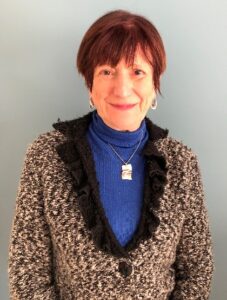 Kathryn du Pree, a life-long expert in addressing the special needs of people on the autism spectrum, will engage in a wide-ranging conversation with Tom Igoe to explore the nature of autism and recent studies that show it becoming increasingly prevalent in the population. They will discuss, among other topics: the educational, behavioral, and job training and transition services available across Connecticut for those on the autism spectrum; the critical role of schools, academies and nonprofit organizations and the dedicated people that serve this population and their families; the difficult staffing challenges that arose during the Covid pandemic and persist today; and the various lifestyle options available for people on the spectrum, including independent living, group homes and employment opportunities, all with a view to enabling these unique individuals to live rewarding and purposeful lives.
Kathryn du Pree, a life-long expert in addressing the special needs of people on the autism spectrum, will engage in a wide-ranging conversation with Tom Igoe to explore the nature of autism and recent studies that show it becoming increasingly prevalent in the population. They will discuss, among other topics: the educational, behavioral, and job training and transition services available across Connecticut for those on the autism spectrum; the critical role of schools, academies and nonprofit organizations and the dedicated people that serve this population and their families; the difficult staffing challenges that arose during the Covid pandemic and persist today; and the various lifestyle options available for people on the spectrum, including independent living, group homes and employment opportunities, all with a view to enabling these unique individuals to live rewarding and purposeful lives.
Autism, which, according to the CDC, may affect as many as 1 in 36 children born today (https://www.cdc.gov/ncbddd/autism/data.html), is a subject about which there remains a high level of mystery and misunderstanding, not only as to the nature of the condition itself but also as to the most desirable means of therapy and treatment for those affected by autism. While there are a variety of programs that have been developed to address autism, treatment remains largely an unregulated enterprise.
Many of those who have been in the field for decades are engaged in helping families to reframe their experience of the condition – starting with the way we understand autism. For example, many families perceive the different behaviors of their child as “autistic” and think of their goals as being to eliminate these behaviors and “fix the child.” This approach reflects a flawed understanding. Autism isn’t an illness. It is a different way of being human. Children with autism aren’t “sick.” They are progressing through developmental stages, as we all do. To help them, we don’t need to change or fix them. We need to work to understand them and then change what we do: we need to change ourselves, our behavior, and the types of support we provide.
Kathryn is an administrator in the field of developmental disabilities, one that has engaged her personally and professionally for almost 50 years. She had a long public service career working in New York and Massachusetts before coming to Connecticut, where she retired from government roles after 12 years as the Deputy Commissioner of the state’s Department of Developmental Services. Her work in these three states focused on closing institutional settings and developing strong community service systems to address the needs of children and adults with developmental disabilities and their families.
She has also consulted with national policy organizations and served as a court monitor in Texas starting in 2014, presiding over a settlement agreement between the state and the U.S. Department of Justice. The focus of the agreement was to develop community services for adults with developmental disabilities who were living in nursing facilities. This is a role she recently returned to, serving as the court monitor for two consent decrees in Illinois involving individuals with various disabilities who have been institutionalized in rehabilitation facilities and nursing homes.
Most recently, Kathryn served as the President & Executive Director of Benhaven in Connecticut from 2016-2023. Benhaven has served individuals of all ages who are on the autism spectrum for over 55 years. (Tom Igoe also serves Benhaven as its Vice Chair and Treasurer.) The nonprofit organization operates two schools, nine small residences, and provides a range of family supports. Under her leadership, the organization developed in-home applied behavioral analysis services for children and transition services offering employment and college course mentoring for young adults.
